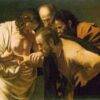Category: Evangelical Calvinist
Writings from the blog: Athanasian Reformed (aka The Evangelical Calvinist). Senior Reformed scholars present a coherent and impassioned articulation of Calvinism for today’s world.
Reading the Bible Theologically versus Naturalistically
It has become almost self-evident that the way Christian persons are to interpret Holy Scripture comes from reconstructing history; through philological acumen; the ability to understand grammatical syntax, etc. While all of this, and more, is important towards culling the heft and riches of Scripture’s intent, in relation to its reality, Jesus Christ, it is not the only way to frame, nor I will suggest, the primary way we should approach the interpretation of the Bible. And since I want this post to be meaningful, in a contemporary sense, I want to focus, once again, on how the above has…
Christ Crucified and the Perfect Tense of Corinthians
The following is an excerpt from my Master’s thesis on first Corinthians 1: 17-25. This will be a quick discussion on the phrase “Christ crucified” found in verse 23. I will follow with a closing word. _____________________ This phrase serves as the content of the proclamation of foolishness, back in verse 21. The term Christ crucified is a perfect passive participle, and it is functioning as an adjectival- substantive participle, meaning the one who was crucified. The perfect participle carries the force of,” … describing an event that, completed in the past …,” and “… has results existing in the present time”…
Don’t Be a Socinian: On the Trinity and Scripture
When philosophical analytic becomes the mode and method of particular theologians and exegetes, historically what we end up with is something like a Socinianism. In the following Richard Muller explicates, a bit, on what a Socinianism entails. In his context he is, of course, engaging with how the Socinians related to the Post Reformed orthodox; particularly in regard to the Socinians’ penchant to reject the Trinity on the grounds of being biblically fiducial over-against, as they would see it, slavishly bound to catholic Church teaching. I want to highlight this movement, once again, in this post, because Socinianism is never…
The Father’s Loving Discipline
4 You have not yet resisted to the point of shedding blood in your striving against sin; 5 and you have forgotten the exhortation which is addressed to you as sons, “My son, do not regard lightly the discipline of the Lord, Nor faint when you are reproved by Him; 6 For those whom the Lord loves He disciplines, And He scourges every son whom He receives.” 7 It is for discipline that you endure; God deals with you as with sons; for what son is there whom his father does not discipline? 8 But if you are without discipline, of which all have become partakers, then you are illegitimate children and not sons. 9 Furthermore,…
Valley of the Shadow of Death: Please Keep Me in Prayer
I have really been going through it. I won’t disclose exactly the source of it all (not sinful or anything), but I have a load of anxiety pulsating through my body even as I type this. The Lord is working, and things are getting better; but I would desperately ask that you hold me up in prayer as you remember me. I literally felt as if I was walking through the valley of the shadow of death, as near as last night. I’m still in that valley, but hopefully mostly through it, and on the upward bound. Stress and anxiety…
Reflecting on Advanced Theology Degrees and a Theology of Glory
I know some tire of me opining on what has been called a ‘theology of glory’ (which is a negative thing), but for me it is seemingly something the Lord always has convicted me on ever since I started radically walking with him. This was of course a theme for Martin Luther who is known for his theology of the cross versus what he identifies as a theology of glory (that of the schoolmen). I believe, ultimately, the Apostle Paul is really the greatest advocate for living a life in the theology of the cross (which of course includes resurrection and ascension). In light…
The Monad’s Banqueting Table: On Classical Theism’s Affectionless God
Classical theism is once again a hot-topic. If you scroll through theo-Twitter you will find an in-house debate on the entailments of a classical theism. But this isn’t just reducible to the debate between the Reformed Baptists, and the impact that Thomas Aquinas has had upon the development of their respective types of Reformed and/or Calvinist theology. This debate is ongoing amongst philosophical theologians like Ryan Mullins, Steven Nemes et al., and whatever their alternative offering might be—whether that be an ‘open theistic’ understanding, or something more phenomenal. And then of course we have the charge against folks like Barth,…
What is History According to Barth’s Theology?: On the Covenant of Grace
Theology ultimately should be a very concrete thing, at least for the Protestant Christian. We are people of the Word of God; we are people who have been radically brought into the life of God by a deep sense of the theology of God’s Word as that has confronted us in the face of a man from Nazareth. It is this Word-grounded reality upon which we, then, as Christians think a God-world / world-God relation; that is, through the analogy of the hypostatic union, of the Theanthropos Godman, Jesus Christ. And it is as we have come to know this…
Logos asarkos, Word without Flesh
Barth’s theology is often tagged as postmetaphysical in line with something like Kant’s, and more to the point, post-Kantian mediating theologians like Albrecht Ritschl, Wilhelm Hermann et al. But this is overwrought in the sense that Barth might be a trained modern theologian, nevertheless he is conditioned more by his reliance on the antique tradition found in the patristic past, and into the modern post reformed orthodox development of Protestant theology in Western Europe. Because of his influences we get a smattering, as Bruce McCormack might say, of a Barth who is both Orthodox and Modern. In this post we…
On the Eschatological Nature of the Theological Task
For Barth dogmatic theology is eschatological, dynamic, personal, and scandalously particular to the person and work of God in Jesus Christ. That is why the work of dogmatics is semper reformanda per the ground and grammar of God’s triune life in Jesus Christ. The work of dogmatic theology is a Petrine ‘growing in the grace and knowledge of Jesus Christ’ in ‘whom are hidden all the treasures of wisdom and knowledge.’ This implies that dogmatic theology should never be stifled by static reception or repristination. As Christians, theologians, we aren’t engaged in an impersonal arid work of dialectical analysis, per…







